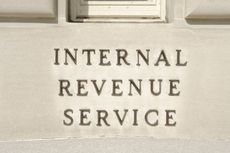From Chatbots to Audits: How the IRS Will Use AI This Tax Season
The IRS has plans to increase its use of AI. Here’s how the agency will do it and what it could mean for taxpayers.


As part of IRS efforts to increase tax enforcement for wealthy taxpayers, the agency is implementing the use of artificial intelligence (AI) to identify possible violations on high-income tax returns.
“We will start to see patterns and trends, and activity that we can link with tax evasion that we couldn’t previously,” IRS Commissioner Danny Werfel said of the agency’s AI use to crack down on so-called “wealthy tax cheats.” Werfel described artificial intelligence and the types of predictive modeling it provides as a “huge tool.”
The IRS will also deploy AI and similar automated technology to improve customer service for taxpayers. However, given a history of biased audit algorithms and other missteps at the agency involving taxpayer records and data, some may wonder whether the IRS’ use of AI will help or hurt.

Sign up for Kiplinger’s Free E-Newsletters
Profit and prosper with the best of expert advice on investing, taxes, retirement, personal finance and more - straight to your e-mail.
Profit and prosper with the best of expert advice - straight to your e-mail.
AI use for IRS audits
AI technology will help the agency sort through tax returns to identify tax evaders. People not paying the taxes they owe is a longstanding problem. The most recent numbers from the IRS reveal that the tax gap (the difference between taxes owed and taxes paid) jumped to $688 billion. The agency sees AI as a tool to help reduce that gap.
However, there has been a lot of controversy and concern surrounding the IRS' use of AI in identifying returns for tax audits. This is largely because the algorithms underlying artificial intelligence, used to identify tax returns for audit, have sometimes produced biased results.
For example, Kiplinger previously reported on a study conducted with support from the U.S. Treasury Department and using IRS data. The findings showed Black taxpayers were selected for audits at significantly higher rates than other taxpayers. Some lawmakers, including Senate Finance Committee Chair Ron Wyden (D-Ore.), have stressed that the agency must do better.
“It’s really important to make sure that there’s better oversight and transparency and accountability,” Wyden told reporters.
Senate Finance member James Lankford (R-Okla.) also has concerns about AI use in taxpayer targeting. Lankford has introduced a bill that would require taxpayers to be given opportunities to appeal some determinations made by AI. Under the proposal, decisions made by AI wouldn’t be automatically reversed. Instead, human review would be required. So, Lankford says, the bill wouldn't be a “get out of jail free” card for wealthy tax evaders.
IRS audit red flags for wealthy filers
The IRS has looked at several factors during its efforts to increase tax enforcement for millionaires and large partnerships. AI can pick up on these patterns and trends when selecting returns for audits. So, wealthy taxpayers should be aware of the agency’s focus areas for enforcement to avoid audit triggers and red flags. Some circumstances that may put you on the IRS’ radar:
- Claiming residence in Puerto Rico (without actually having real residency there)
- Claiming exemptions based on treaty rules between the U.S. and Malta.
- Failing to file tax returns but making luxury purchases
- Illegally moving assets into offshore accounts
- Contractors claiming to make Form 1099-MISC/1099-NEC payments to subcontractors that appear to be “shell” companies
- FBAR violators (those who have foreign bank accounts but do not file a Report of Foreign Bank and Financial Accounts)
- Being involved in significant cryptocurrency exchanges
There are other circumstances that may trigger an audit, including but not limited to, deducting large charitable contributions and failing to report all taxable income.
Chatbots for IRS customer service?
The IRS has already implemented chatbots to improve customer service, and the agency is expanding the technology to help more taxpayers. These chatbots can help taxpayers resolve certain issues, such as what to do if they’ve received an IRS notice and need more time to respond.
According to the IRS, chatbots have already handled more than 450,000 interactions. Of those interactions, the agency says 42% were resolved without a live customer service representative. That means taxpayers didn’t need to wait on hold. It also means agents, who would have otherwise been answering phone calls, were able to focus their time on other duties.
AI use at the IRS: Bottom line
It’s no secret that the IRS has turned its attention to high-earners, including large partnerships, since receiving funding from the Inflation Reduction Act. So, wealthy taxpayers may have increased odds of facing an audit.
However, it’s too soon to say whether the IRS’ use of AI for identifying possible cases of tax evasion will target law-abiding wealthy filers. It's also too early to know if taxpayers will be helped by AI-driven chatbots.
But one thing is for sure: There’s never been a more important time for high earners to follow tax laws. Audit or not, if you’re complying with IRS rules and regulations, you can hopefully worry a little less about AI and the IRS' focus on high earners.
Related Content
- IRS Services Improve but Are Still Lacking
- IRS Ramps Up Tax Enforcement for Millionaires
- IRS Promises Fewer Audits of Earned Income Tax Credit Claims

Katelyn has more than 6 years’ experience working in tax and finance. While she specializes in tax content, Katelyn has also written for digital publications on topics including insurance, retirement and financial planning and has had financial advice commissioned by national print publications. She believes that knowledge is the key to success and enjoys helping others reach their goals by providing content that educates and informs.
-
-
 Food Costs Are Up — Along With Promotions
Food Costs Are Up — Along With PromotionsWith food costs still high, you’re being more choosy about where to shop and dine. Supermarkets and restaurants are getting the message.
By Jamie Feldman Published
-
 Giving to Charity This Holiday Season? Eight Tips for Doing It the Right Way
Giving to Charity This Holiday Season? Eight Tips for Doing It the Right WayMaximize your efforts by following these expert-recommended tips.
By Kiplinger Advisor Collective Published
-
 You May Have to Put Catch-Up Contributions in a Roth 401(k): That's Not a Bad Idea
You May Have to Put Catch-Up Contributions in a Roth 401(k): That's Not a Bad IdeaRoth 401(k) High earners will be required to put their catch-up contributions in a Roth 401(k).
By Sandra Block Published
-
 Charitable Donations: What To Know About Scams and Taxes Before You Give
Charitable Donations: What To Know About Scams and Taxes Before You GiveDonations Giving to a charity can make you feel good and lower your tax bill, but the IRS says to beware of fake charities.
By Katelyn Washington Last updated
-
 Are I Bonds Taxable? 10 Common Situations
Are I Bonds Taxable? 10 Common Situationstaxes Series I bonds are a popular investment that can also help you save on taxes, but the federal income tax consequences can be complex.
By Joy Taylor Last updated
-
 Should You Withdraw Your ERC Claim?
Should You Withdraw Your ERC Claim?Tax Credits The IRS says certain businesses can withdraw potentially fraudulent employee retention tax credit claims.
By Katelyn Washington Published
-
 13 States Sign On to IRS Direct File Pilot Program
13 States Sign On to IRS Direct File Pilot ProgramTax Filing The IRS will pilot its free online direct tax filing service, with help from several states.
By Katelyn Washington Last updated
-
 Five Tax Breaks for Paying Your Student Loan
Five Tax Breaks for Paying Your Student LoanTax Letter After a three-year pause, student loan payments have resumed, putting a dent in people's wallets. But there are some tax breaks that can help.
By Joy Taylor Published
-
 IRS Gives California a Last-Minute Tax Deadline Extension
IRS Gives California a Last-Minute Tax Deadline ExtensionTax Deadline As of today, Californians have another tax deadline extension from the IRS — this time until November.
By Kelley R. Taylor Published
-
 Period Care Coalition Offers 'Tampon Tax Back' Refunds
Period Care Coalition Offers 'Tampon Tax Back' RefundsSales Tax A coalition of menstrual product brands offers sales tax refunds on period products. Here’s how to get yours.
By Kelley R. Taylor Published









